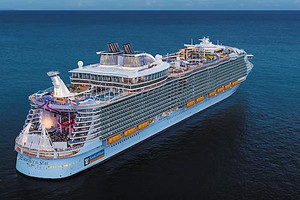
Seasickness can easily turn a holiday of a lifetime into a nightmare from hell. It is a common disturbance of the inner ear, caused by repeated motion such as the swell of the sea, the movement of a car, or the motion of a plane in bumpy air. The good news, however, is that besides taking some well-tried remedies with you in case you succumb to sea sickness, there are a number of other things you can do to avoid feeling queasy in the first place.
Your Ship
If you are unsure of your sea legs, choose a large, modern cruise ship which is equipped with stabilisers to minimise motion. If you should meet with any rough weather at sea, a larger ship is better able to handle the rolling and motion.
Your Accommodation
If you suffer from sea sickness, always book a stateroom which is right in the middle of the ship and as close to the waterline as possible; this is the ship’s natural balance point, with the least movement. Also always book a stateroom with an ocean view, and if your budget can stretch to it, a balcony is advisable so you can get fresh air quickly when you need it.
Your Itinerary
If you are new to cruising, and unsure of your sea legs, don’t pick a cruise which has a large number of sea days or which involves long crossings in open ocean. Also avoid cruising areas where the ocean is known to be rough, such as the far North Pacific or the Great Southern Ocean, and avoid cruising at a time of year when weather can have an impact, such as cyclone or hurricane season.
What To Do, And Not Do, On Board
Even a seasoned cruiser needs a few days to get his sea legs in check, so during the first few days spend as much time outside in the fresh air, and using the horizon as a point to help maintain your equilibrium. That said, don’t stay in the sun too much as becoming overheated or dehydrated can also make you feel ill. Other tips include being careful when using a treadmill, reading a book, or using a computer if the ship is experiencing some motion, and avoid enclosed spaces.
Eating And Drinking
Avoid eating rich or fatty foods until you are steady, and don’t drink too much alcohol as it speeds up dehydration which can cause nausea or make existing nausea worse. Try not to cruise on an empty stomach, however, as this can be almost as bad as having one with the wrong foods in it!
Preventive Remedies
Ginger is a common herbal remedy for travel sickness and to prevent the risk of feeling queasy you can take ginger capsules for a few days, drink ginger tea or chew on crystallised ginger or ginger sweets just in case. Green apples are also a popular remedy which some people swear by, and can be added to your breakfast in the morning as a preventive.
- By:
- Joanna Hall






